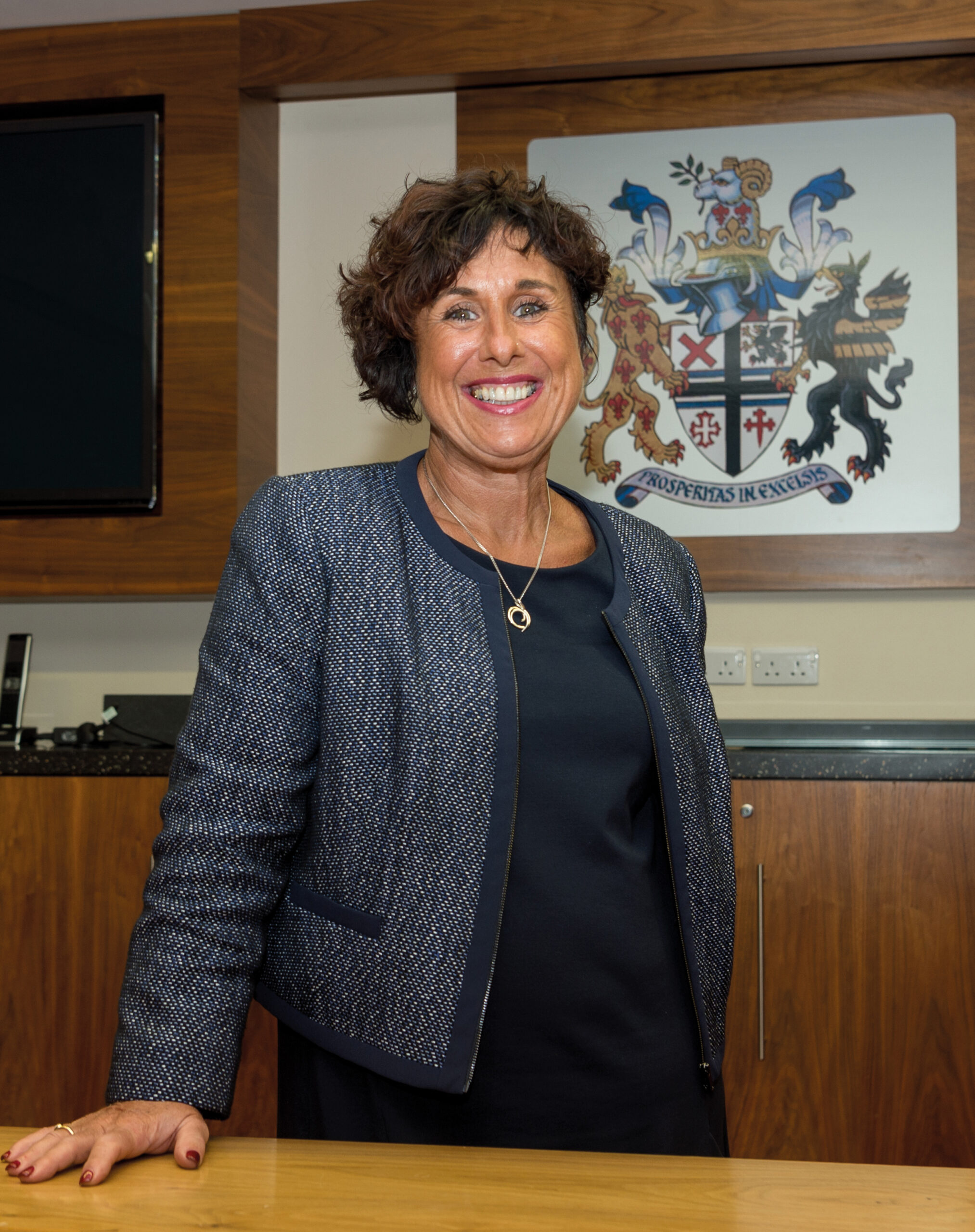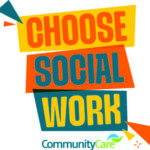
For Kath and Rebecca O’Dwyer, social work is a family affair.
Both Rebecca’s parents were social workers, so it should have come as little surprise when she decided to follow in their footsteps. So much so that, on her first day as a qualified social worker, she wore almost the same outfit as her mum!
However, Kath’s social work days are long behind her. She is now chief executive officer of St Helens council, following a career, spanning over 40 years, that has seen her take up many roles: social worker, team manager, service manager, assistant director, director of children’s services, executive director for people and Ofsted national director.
“Either I was underdressed as a chief executive or she was overdressed as a social worker!” wrote Kath, sharing a photo of the two on Rebecca’s first day, on LinkedIn.
In an interview with Community Care for our Choose Social Work campaign, they discussed their individual experiences of social work, how it has affected their family, the lessons they’ve learned and whether they would recommend it as a profession.
Kath, tell me about your career in social work. How was your experience?

Pictured: Kath O’Dwyer
I must admit that during my social work career I have worked my socks off and I’m sure Bec will do the same. I don’t think there’s a more rewarding career. You get to make a difference to the lives and outcomes of children and their families and your colleagues often become friends for life. I’m still mates with folks I was a baby social worker with.
It’s a brilliant career, it’s rewarding but it’s tough, and it’s not helped by media coverage when things go wrong. Social workers get the blame when things go wrong, but I don’t think I know a single case where a social worker killed or harmed a baby.
But social workers always get blamed – when it actually depends on lots of factors, one of which is the environment in which they are working: the support in place, the caseload and the access to training they have. But also, at the end of the day, social workers haven’t got a crystal ball. Parents who kill or harm children are highly skilled and manipulative. There’s no profession that would be able to predict or pre-empt that 100% of the time.
So I think it’s also a tough gig. Hours are unpredictable. The nature of what you do is unpredictable – some of it is scary, some of it can be personally threatening. I’ve certainly had my picture in the national newspapers when removing a child. There aren’t many jobs where that happens to you. But it’s also massively rewarding.
What would you say you’ve learned in all those years working in social work and local government?
I was lucky – I had some brilliant managers and, as I was progressing, I had one or two that weren’t, so you learn what not to do as well as how to do it well.
As a leader in social work, you have the responsibility to create an environment for social workers to be the best they can be. Ensure you give them a voice and you listen to them; give them the tools to do the job and the support to do it well.
In terms of work-life balance and juggling a career and a family, [working at Stoke-on-Trent] I learned that some things are just too important to miss and sometimes work can wait. It was quite a commute so I would often leave before the kids were awake and wouldn’t be home by the time they went to bed, so it was really important to prioritise some things and be there.
Rebecca: I was quite young, still in primary school. In the mornings, when mum knew she wouldn’t be there before I woke up or went to bed, she’d write a little note and put it in my room, or in my PE bag or lunch box. Even now, I’ve still got a bag full of two-and-a-half years’ worth of little post-it notes.
Kath: It was often knocking at eight o’clock before I was home. So sometimes she’d be in bed because Rebecca was the youngest. So that was tough, but I always tried my best to be there at least for the big things. I really tried to never miss a parents’ evening, a class assembly or a sports day.
So, even now as a chief executive, I have a thing about family first and encouraging my staff to prioritise family where possible. You’re no good to the council if you’re no good to your family.
Why should people choose social work as a career? Tell us in the comments below and become part of our Choose Social Work campaign!
Rebecca, your mum and dad were both social workers. How did that prepare you for the profession?

Pictured: Rebecca O’Dwyer
I was brought up around social work so I had a greater understanding of it at a much younger age than most. I knew it wasn’t just removing children, there was much more to it than that. A lot of work goes into trying to avoid that and seeking to keep families together, where possible.
I also had a very true reflection of the working hours and how, as social workers, we can be pulled in different directions at different times.
Kath: You can have plans that evening, go out on a visit at four o’clock and you’re still there at nine. That was something that Rebecca must have remembered because the first week in her job she was saying, “I can’t make any plans this week because I don’t know what time I’m going to be home”.
Rebecca: It wasn’t a shock when I had to stay late. I hope it doesn’t happen all the time because I do think you need your own time but, if flexible boundaries are put into place, then you can achieve the right balance.
What inspired you to become a social worker?
I always wanted to have a role that makes a difference and where you can see the change being made. I also wanted to work with children.
After my undergrad, I worked in a children’s residential home for a while, where I would sleep overnight, care for the children, take them out, deal with any incidents that happened, be involved in the planning etc. You spend 40 hours a week with the children and that can be very difficult in itself, but that’s where I realised that working with vulnerable children can be really rewarding.
So, I decided to do my Master’s in social work and told my mum and dad. I think they were shocked, thinking that they might have put me off, watching their careers and the stress that the job can cause, but they were really supportive too.
Kath: We were slightly worried for her. But she’s absolutely passionate and that just oozes out of her so there was no point in even trying to talk her out of it.
Rebecca: I felt very confident it was the right decision because you do make a difference to families as a whole. Working at the residential home, I also picked up a lot of what makes a good social worker and what doesn’t, what the children like about certain social workers and what they didn’t. I realised what sort of social worker I wanted to be before I even started.
Rebecca, what are your ambitions for your career?
I like doing direct work and interventions with families, to see from the start how their life is changing. Yes, it won’t always be positive, and some difficult decisions will have to be made. But I think holding on to that positive work you have done is always key in keeping your personal motivation.
I do want to progress, but not at the rate or level that mum has, and that isn’t because I’m not proud of her, I just don’t think I’d want to put in the hours she has for such a long time. I want to register for my practice educator course as soon as I can, so I can have students and eventually I’d like to progress maybe to be head of service. I think that is the level that I’d stop at. But I’m sure, when the time comes, my mum will encourage me to go a bit further than that [laughs].
 We interviewed Kath and Rebecca as part of Community Care’s Choose Social Work campaign, which aims to champion the brilliant work social workers do every day, inspire the next generation of practitioners and counteract the negative media coverage of the profession.
We interviewed Kath and Rebecca as part of Community Care’s Choose Social Work campaign, which aims to champion the brilliant work social workers do every day, inspire the next generation of practitioners and counteract the negative media coverage of the profession.
Read about why we’ve launched this campaign, and the five steps you can take to support it. On our campaign page, you will find more inspiring stories about the difference that good social work makes, as well as our series of Dear Future Social Worker letters, encouraging the next generation to choose social work as a fulfilling, rewarding career.
Kath, what advice have you given Rebecca?
Work-life balance is key. And I have to admit that’s something I never cracked. But I wouldn’t want anybody else to work the hours I’ve worked (and currently work). I wouldn’t want that for Rebecca.
So, keeping a handle on that and ensuring a work-life balance [is a must], but also take the opportunities, be the best you can be, because actually the kids and the families deserve that. So, if there are opportunities to learn more or develop new skills, then take them. I did a Master’s in social work when I was a social worker, and I learned loads.
My advice to Bec is: be the best you can be at whatever it is you’re doing – it doesn’t matter what level it is. Some practitioners have been social workers for 40 years, because they didn’t want to be a manager, and there’s nothing wrong with that. That’s not failing. That’s just being clear about what you want to do.
Kath, was there a defining moment in your career?
There’s loads of stuff that we still talk about at the tea table at home. There are children I was a social worker for that I still remember every detail about and still wonder where they are and what they’re doing. There will be children in Rebecca’s career where they’ll have a real impact on her – either because of what’s happened to them or the progress you worked with them to achieve.
I don’t think there was a defining moment. I don’t think I ever planned to be a team manager (and certainly never planned to be a chief executive), but sometimes you look around you and you think, maybe I could do it better than that. So, I’ll give it a go. I covered a maternity leave as a team manager to see whether I liked it, and decided that I did.
Would you say people should join the social work profession?
Kath: I think it’s a highly skilled profession, not a job, and it’s a really tough but rewarding one. If you choose to, you can have a great career. Being a public servant is a privilege, and we should view it as that. Our children and families need passionate, energised and committed public servants to help, support and protect them. So why would you not want to do that?
Rebecca: I think it is going to be a rewarding career and, if the right boundaries are set in place, then it can be a very long one too. I’ve seen from my mum and dad that it doesn’t have to be a seven-year job and then you go into something else. We can make a fully-fledged career out of it (with the right balances) and you don’t have to leave because you’ve burned out. I’m really looking forward to my long career.
More from Choose Social Work
- ‘It was wonderful to have somebody show me they really cared’
- Thinking of becoming a social worker? This letter is for you
- Isabelle Trowler: ‘Cherish the responsibility you have’
- ‘You can literally change a young person’s life’: an 18-year-old’s message for social workers
- ‘What I wish I’d known before becoming a social worker’
- Jenny Molloy: ‘Social workers have been so important in my life’






 Family help: one local authority’s experience of the model
Family help: one local authority’s experience of the model  ‘I spent the first three months listening’: how supportive leadership can transform children’s services
‘I spent the first three months listening’: how supportive leadership can transform children’s services  How senior leaders in one authority maintain a culture of excellence
How senior leaders in one authority maintain a culture of excellence  How staff support ensures fantastic outcomes for children and families
How staff support ensures fantastic outcomes for children and families  Workforce Insights – showcasing a selection of the sector’s top recruiters
Workforce Insights – showcasing a selection of the sector’s top recruiters 

 Facebook
Facebook X
X LinkedIn
LinkedIn Instagram
Instagram
My mother was a residential social work team manager my sister a social worker I was a nurse then a social worker. If any of my children wanted to follow me I’d tell them to run for the hills. It’s a shambolic mess where apathy now replaces empathy that was and kindness has been replaced by balance sheets.